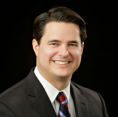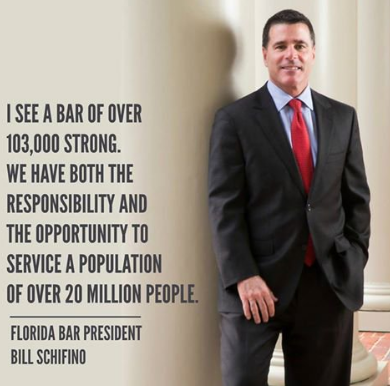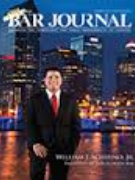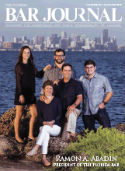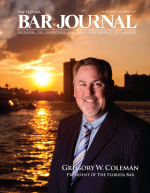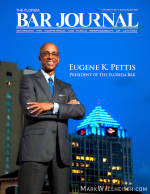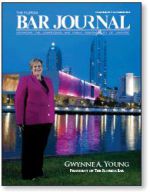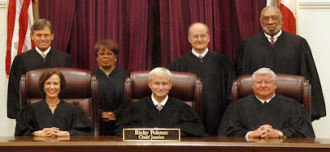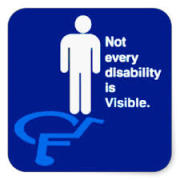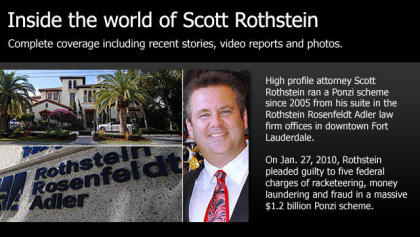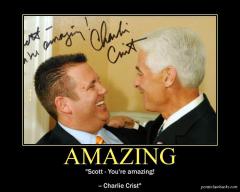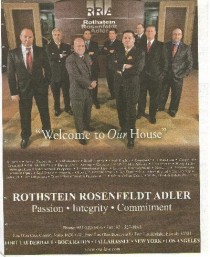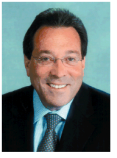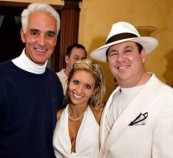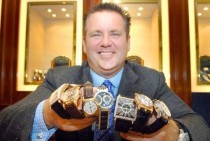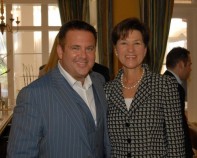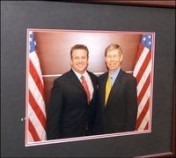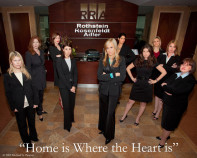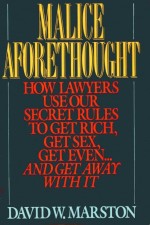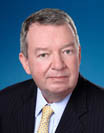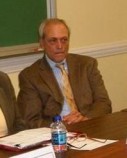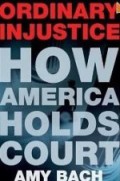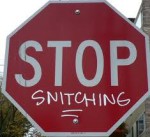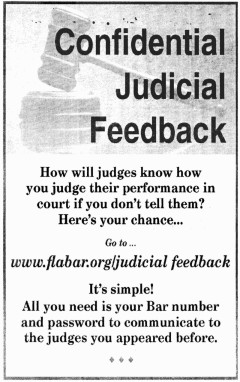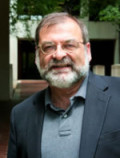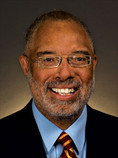The Florida Bar, an unincorporated association
Ordinary citizens, not lawyers, should run the disciplinary process. If a jury made up of non-lawyers is good enough to decide a murder case or a million dollar lawsuit, it's certainly capable of determining whether a lawyer has cheated a client.
The Florida Bar: Overview of Lawyer Discipline
Executive Director, The Florida Bar
After a national search, the new executive director of The Florida Bar was found across the street from the Tallahassee headquarters at the Federal Bureau of Investigation.
Special Agent Joshua Doyle, 37, will become the new executive director, succeeding John F. Harkness, Jr., who is retiring after 37 years at the helm of the 104,000-member Bar. Read more
John F. Harkness, Jr. (Retired)
Executive Director, The Florida Bar
651 E. Jefferson Street
Tallahassee, Florida 32399-2300
President and Officers of The Florida Bar
Publications of The Florida Bar
Florida Commission on Access to Civil Justice
____________________________________________________
The Florida Bar is overhauling its website
So many of the links below no longer work. I will update the links as time and access allow. These links are working.
The Florida Bar News Releases
The Florida Bar Daily News
The Florida Bar News
The Florida Bar Journal
The Florida Bar YouTube
The Florida Bar Publications
Future of the profession: Will Computers Replace Judges?
- Can/Should Computers Replace Judges? Anthony D’Amato
- The Yale Law Journal - Forum: Judges in Jeopardy!: Could IBM’s Watson Beat Courts at Their Own Game?
- Technology Assisted Review: The Judicial Pioneers
- ABA Legal Technology Resource Center
Authority for The Florida Bar
Article V, Section 15 of the Constitution of the State of Florida [Wikipedia] gives the Supreme Court of Florida [Wikipedia] exclusive authority to regulate the admission of persons to the practice of law and the discipline of those persons who are admitted to practice. The Court performs those official functions through two separate arms: the Florida Board of Bar Examiners, which screens, tests and certifies candidates for admission to the practice; and The Florida Bar [Wikipedia], the investigative and prosecutorial authority in the lawyer regulatory process.
Prior to adoption of Florida’s current version of Article V, the Supreme Court created our state’s unified bar [Wikipedia] by its own action, in the case of Petition of Florida State Bar
Ass'n, 40 So.2d 902 (Fla. 1949). The Supreme Court further specifies the powers and duties of the Bar through its Rules Regulating The Florida Bar, which superseded the Integration Rule in 1986 that
had previously contained such guidance - see In
Re Rules Regulating The Florida Bar, 494 So.2d 977 (Fla.1986).
From the email August 20, 2013 of Jenny R. Jolinski, CRM CDIA+, Records Manager, The Florida Bar, re "Per our General Counsel".
- History of The Florida Bar
- Frequently Asked Questions About The Florida Bar
- Link to The Florida Bar’s Financial Statements
TFB Integration - 1949 Petn to Integrate[...]
Adobe Acrobat document [1.5 MB]
Petition of Fla State Bar Assn 40 So2d 9[...]
Adobe Acrobat document [2.5 MB]
William J. Schifino, Jr. President of
The Florida Bar Journal
July/August, 2016 Volume 90, No. 7
by Jan Pudlow
Wearing little blue blazers and bow ties, the young boys gathered in the courtyard for morning prayers at the Academy of the Holy Names in Tampa. Even as grade-schoolboys, they recognized that one classmate stood out as a leader.
His given name is William Schifino, Jr., but back then everyone called him Billy, and his closest buddies called him "Feenz."
"From day one at the boys academy, he came in very much self-possessed and as a leader," recalls childhood friend Jay G. Trezevant, who grew up to be an assistant U.S. attorney in Tampa. Read more
Ramón A. Abadin: President of The
Florida Bar The Florida Bar Journal
July/August, 2015 Volume 89, No. 7
by Jan Pudlow
Soot and smoke swirled in the engine room of the Langfitt, where young Ramón Abadin sweated in 120-degree heat as a "wiper" cleaning behind boilers. Abadin was glad to snag this job working on the 351-foot dredge boat....read more
Installation Speech of 2015-16 Florida Bar President Ramon A. Abadin, June 26, 2015
Published on July 1, 2015
New Florida Bar President Ramon A. Abadin delivers his commencement speech in front of Bar members, judges and members of the Florida Supreme Court at The Florida Bar's 65th Annual Convention in Boca Raton.
Message From The President of The Florid[...]
Adobe Acrobat document [308.1 KB]
Article V, Section 15 of the Constitution of the State of Florida gives the Supreme Court of Florida exclusive authority to regulate the admission of persons to the practice of law and the discipline of those persons who are admitted to practice.
Article V, Section 15. Attorneys; admission and discipline.—The supreme court shall have exclusive jurisdiction to regulate the admission of persons to the practice of law and the discipline of persons admitted.
The Florida Supreme Court claims it performs those official functions through two separate arms:
- The Florida Board of Bar Examiners, which screens, tests and certifies candidates for admission to the practice; and
- The Florida Bar, the investigative and prosecutorial authority in the lawyer regulatory process. (attorney discipline)
Gregory W. Coleman: President of The
Florida Bar
The Florida Bar Journal
July/August, 2014 Volume 88, No. 7
by Jan Pudlow
Surfing when the wind whips up big waves. Skiing behind a Mako fishing boat. Fishing, diving, swimming, and hanging out at the beach with friends. read more
Within the Bar, lawyer discipline is controlled by five individuals, the Chief Branch Discipline Counsels of the five Branch Offices located in Tallahassee, Tampa, Orlando, Ft. Lauderdale, and Miami.
- Allison Sackett, Tallahassee Chief Branch Discipline Counsel
- Sheila M. Tuma, Tampa Chief Branch Discipline Counsel
- Jan K. Wichrowski, Orlando Chief Branch Discipline Counsel
- Alan Pascal, Ft. Lauderdale Chief Branch Discipline Counsel
- Arlene K. Sankel, Miami Chief Branch Discipline Counsel
Other key people at The Bar's Tallahassee Headquarters include,
- Shanell Schuyler, Director, Attorney Consumer Assistance
- Mary Ellen Bateman, Director, Special Projects Division
- Lori S. Holcomb, Counsel, UPL Counsel
- Linda S. Calvert Hanson, Director, Professionalism Center
- P.J. Osborne, Coordinator, Clients’ Security Fund
Eugene K. Pettis — First
African-American President of The Florida Bar
The Florida Bar Journal
July/August, 2013 Volume 87, No. 7
by Jan Pudlow
When Eugene Pettis was a little boy, a speech impediment smacked a "K" sound at the start of every word. Neighbors would tell the other Pettis kids: "Go get your brother," because they wanted to hear Eugene talk for comical entertainment. read more
Each Branch Office has a handful of Assistant Staff Counsels and a number of grievance committees that consider ethics and other complaints against lawyers. The organizational chart below shows 79 grievance committees comprised of over 700 volunteers.
You probably know one former member of a grievance committee even if you are not a lawyer. His name is Scott Rothstein, the same Scott Rothstein who ran a $1.2 billion investment scam.
Gwynne Alice Young: President of The
Florida Bar
The Florida Bar Journal
July/August, 2012 Volume 86, No. 7
by Jan Pudlow
When Sylvia Walbolt suggested a friend get married at her family’s place in rural Hillsborough County on Lake Josephine, she envisioned an intimate affair with a few dozen people gathered at the dock. read more
John T. Berry is the Legal Division Director, and Adria Quintela is Director of Lawyer Regulation, but they are deferential to the five Chief Branch Discipline Counsels in matters of attorney discipline.
Attorney Consumer Assistance Program (ACAP). The Florida Bar accepts complaints against attorneys, investigates those complaints and prosecutes attorneys who engage in unethical conduct. For individuals who are unsure if a lawyer has acted ethically or who are dissatisfied and wish to consider whether filing a complaint may be appropriate, The Florida Bar operates the Attorney Consumer Assistance Program (ACAP). The ACAP telephone number is toll-free: 1-866-352-0707.
The Clients' Security Fund was created by The Florida Bar to help compensate persons who have suffered a loss of money or property due to misappropriation or embezzlement by an attorney.
Consumer Information. The Florida Bar provides information for the public on certain general areas of law as well as specific legal issues in Consumer Pamphlets.
Bar presidents are annual rotating figureheads with little say in the discipline process. Executive Director John F. Harkness, Jr. keeps the bureaucracy moving. There are 52 members of the Board of Governors
who formulate and adopt matters of policy. And a hard-working staff that performs the work of running The Bar.
The five Chief Branch Discipline Counsels hold the real power over discipline of lawyer misconduct. Once a Chief Branch Discipline Counsel makes a decision, the rest of The Bar
supports the finding.
__________________________________________________
The 10 Most Important Things to Know
about Lawyer Regulation by The Florida Bar
___________________________________________________
The Florida Supreme Court - 7 lawyers to regulate 100,000 lawyer members of The Florida Bar
In-re-Amendments-RRTFB-1-3.1(a), FlaRJud[...]
Adobe Acrobat document [226.4 KB]
The Operation and Jurisdiction of the Florida Supreme Court
Reprinted 1995 by the Supreme Court of Florida
Originally published at 18 Nova L. Rev.1151 (1994)
The Operation and Jurisdiction of the Supreme Court of Florida (PDF) Harry Lee Anstead, Gerald Kogan, Thomas D. Hall, Robert Craig Waters
Florida Board of Bar Examiners
In Florida the admission of attorneys to the practice of law is a judicial function. This board is an administrative agency of the Supreme Court of Florida created by the Court to handle matters of bar admission. The primary purpose of the character and fitness screening before admission to The Florida Bar is to protect the public and safeguard the judicial system. The primary purpose of the bar examination is to ensure that all who are ultimately admitted have demonstrated minimum technical competence. In order to be admitted in Florida, an applicant must have proof of good moral character and must successfully complete the Florida Bar Examination. Notice, public seat vacancies, February 13, 2014.
The Florida Board of Bar Examiners Re: J.R.B. [November 20, 2014]
Summer 2014 Bar Examination Results
________________________________________________________
Response of Robert Blythe, Florida Board[...]
Adobe Acrobat document [332.3 KB]
2009, Character and Fitness Commission R[...]
Adobe Acrobat document [187.5 KB]
Mark-A-Adams-Scores-and-Recommendations-[...]
Adobe Acrobat document [445.6 KB]
Oath of Admission to The Florida Bar
Revised admission oath now emphasizes
civility
The Florida Bar News
By Jan Pudlow, Senior Editor
October 1, 2011
In an adversarial system, lawyers don’t always play nice. Attorneys don’t always address their arguments to the court, sniping at each other instead. Polite
communication devolves into snarky emails. Tempers flare at depositions. Good manners, professionalism, and civility sometimes get lost in the fray of winning a case.
So, on September 12, the Florida Supreme Court added this new language to the Oath of Admission to The Florida Bar, sworn to by every new lawyer, effective
immediately:
"To opposing parties and their counsel, I pledge fairness, integrity, and civility, not only in court, but also in all written and oral communications."
"It’s something that should have been in the oath of admission from the beginning, in my opinion," said Robert A. Cole, of Jacksonville, immediate past president of
FLABOTA, the state chapter of the American Board of Trial Advocates that has been working on this issue for years, along with The Florida Bar and
law schools.
"We should all treat each other with professionalism and civility. It should be understood. But I think it’s just reacting to the lack of civility that is going on in
our society as a whole — not just the legal profession. I think it was the right thing to do by the Supreme Court."
Acting on its own in a unanimous decision in Case No. SC11-1702, the court
noted two trends: Growing concerns in recent years about incivility among attorneys, and that ABOTA, among others, have taken steps to raise the
level of awareness about the importance of civility in practicing law. Read more
Oath of Admission to The Florida Bar (Center for Professionalism)
- Creed of Professionalism The Florida Bar (PDF here)
- ABOTA Code of Professionalism
- American Board of Trial Advocates (ABOTA)
- Professionalism Expectations. A document approved by The Florida Bar Board of Governors on January 30, 2015 to replace the Ideals and Goals of Professionalism.
In re: Oath of Admission to the Florida Bar, 73 So.3d 149 (Fla.2011)
Supreme Court of Florida
September 12, 2011
OATH OF ADMISSION
I do solemnly swear:
I will support the Constitution of the United States and the Constitution of the State of Florida;
I will maintain the respect due to courts of justice and judicial officers;
I will not counsel or maintain any suit or proceedings which shall appear to me to be unjust, nor any defense except such as I believe to be honestly debatable under the
law of the land;
I will employ, for the purpose of maintaining the causes confided in me such means only as are consistent with truth and honor, and will never seek to mislead the judge
or jury by any artifice or false statement of fact or law;
I will maintain the confidence and preserve inviolate the secrets of my clients, and will accept no compensation in connection with their business except from them or
with their knowledge and approval;
To opposing parties and their counsel, I pledge fairness, integrity, and civility, not only in court, but also in all written and oral communications;
I will abstain from all offensive personality and advance no fact prejudicial to the honor or reputation of a party or witness, unless required by the justice of the
cause with which I am charged;
I will never reject, from any consideration personal to myself, the cause of the defenseless or oppressed, or delay anyone’s cause for lucre or malice. So help me
God.
PDF includes SC11-1702, ABOTA Code, the Creed, Professionalism Expectations, Bar Rule 3-4.7
OATH OF ADMISSION sc11-1702-ABOTA-ProfEx[...]
Adobe Acrobat document [489.9 KB]
The American Bar Association - ABA
American Bar Association (ABA)
American Bar Association (ABA), Wikipedia
American Bar Association’s Mission:
"To serve equally our members, our profession and the public by
defending liberty and delivering justice as the national
representative of the legal profession."
ABA Model Code of Professional Responsibility, Wikipedia
During a key debate in late January 1982 over whether to replace the Model Code with the Model Rules, one delegate "referred to the nine canons, 129 ethical
considerations and forty-three disciplinary rules as a three-dimensional chess game that lawyers played at their own peril." Read more
The ABA Commission on Disability Rights (CDR)
ABA Commission on Disability Rights (CDR)
"The Commission advocates for the legal rights of persons with disabilities, seeking to eliminate the obstacles created by stigma and prejudice based on stereotypes and to ensure their equal participation and meaningful inclusion in society."
ABA Commission on Mental and Physical Disability Law
The ABA Commission on Disability Rights (CDR) consists of 15 members appointed by the ABA President-elect on an annual basis. It meets bi-annually. Katherine H. O'Neil,
Esq. currently sits as Chair of the Commission.
The ABA’s Commission on the Mentally Disabled was established in 1973 to respond to the advocacy needs of persons with mental disabilities. After the passage of the
Americans with Disabilities Act of 1990, the ABA broadened the Commission’s mission to serve all persons with disabilities and changed its name to the Commission on Mental and Physical Disability
Law. In 2011, the members changed the name to the Commission on Disability Rights to better reflect its mission. Today, the Commission carries out an array of projects and activities addressing
disability-related public policy, disability law, and the professional needs of lawyers and law students with disabilities. Read more
___________________________________________________
Court urges all bars get right with the ADA
Court urges all bars to get right with
the ADA
The Florida Bar News
By Jan Pudlow, Senior Editor
March 1, 2014
Stephanie Woodward One woman in a wheelchair — excluded from a voluntary bar social gathering in a basement wine cellar without an elevator — sparked a strong directive from the Florida Supreme Court: All bar meetings must be accessible to all.
Stephanie Woodward recently moved from Syracuse, N.Y., to Miami, passed the Florida bar exam, and awaits approval of her character and fitness check so she can be a full-fledged member of The Florida Bar.
As a "baby lawyer" new to town, she is anxious to make connections in the legal profession. So she was excited about an invitation to attend a Dade County Bar Association Young Lawyers Section event called "An Evening with the Judges" — described as "an informal gathering to promote communication among the legal community and the bench." Read more
Links to The Florida Bar
The Florida Bar 2005 Membership Opinion
Survey
The Florida Bar 2006 Special Commission on Lawyer
Regulation
The Florida Bar 2012 Hawkins Commission Report on Discipline
Related story South Florida Business Journal by Paul Brinkmann
The Florida Bar Informational Packet, Candor Before The Tribunal
The Florida Bar Reports
The Florida Bar Ethics - Informational Packets
The Florida Bar News
The Florida Bar Journal
Florida Rules of Court Procedure
The Florida Bar Legislation of Interest to the Legal Profession
The Florida Bar Welcome to Our Legislation Page
The Florida Bar Newspaper Links
Florida State Court System Office of The Inspector General
Fla. Const. Art I, Sec. 24 Access to public records and meetings
Florida Statutes Chapter 119 Public Records
Florida Statutes Chapter 286 Public Business
Reporters Handbook Sunshine and Public Records Laws - Part
1
Reporters Handbook Sunshine and Public Records Laws - Part 2
Sunshine Foundation Requesting Public Records
Open Government The "Sunshine" Law
Attorney General Government-in-the-Sunshine Manual
Florida Bar Appellate Section The Pro Se Appellate Handbook
The Florida Bar Wikipedia
Bar association, integrated bar Wikipedia
Admission to the bar in the United States Wikipedia
Public Access to Judicial Branch Records, Art. I, § 24, Fla. Const
Fla. R. Jud. Admin. Rule 2.420(m)(1)
(m) Procedure for Public Access to Judicial Branch Records. Requests and responses to requests for access to records under this rule shall be made in a reasonable
manner.
(1) Requests for access to judicial branch records shall be in writing and shall be directed to the custodian. The request shall provide sufficient specificity to enable
the custodian to identify the requested records. The reason for the request is not required to be disclosed.
Florida Bar Disciplinary Statistics for years 1996-2014
In financial year 2007-2008 the bar spent $9,968,598 on lawyer discipline, which amounts to a cost per sanction of $24,137.04 according to the bar’s statistics.
1996-2014 Florida Bar discipline statist[...]
Adobe Acrobat document [276.5 KB]
Florida Bar admits statistics snafu.pdf
Adobe Acrobat document [31.3 KB]
No private right of action against The Fla Bar (it claims)
The decision whether to initiate disciplinary proceedings is solely within the discretion of The Florida Bar, subject only to the review by the Florida Supreme Court. The Bar contends that no private right of action against The Bar exists in any person for the failure to institute disciplinary proceedings. Read more here about how The Bar defends lawsuits in The Florida Bar General Counsel’s Litigation Status Report of September 15, 2008.
2008, 11-24-08, Litigation Status Report[...]
Adobe Acrobat document [2.5 MB]
Florida Lawyer-Judge Scandals
Florida Foreclosure King David J. Stern
There was no justice for homeowners wrongly foreclosed by David J. Stern Enterprises (DJSE). Florida Attorney General Pam Bondi did not prosecute Mr. Stern or DJSE for foreclosure related crimes.
David J. Stern Disbarred, Order SC13-643
Penalty: 49 cents per 100,000 abandoned foreclosure cases
The Florida Supreme Court gave David J. Stern a sweetheart disbarment deal: 49 cents per 100,000 abandoned foreclosure cases, which The Bar’s Referee Nancy Perez wrote "created chaos on the courts of the state of Florida, prejudicing the whole system as a whole." (page 4, Report of Referee SC13-643).
Mr. Stern gets to keep a $58.5 million cash windfall for the sale of his back-office document preparation services, according to the Palm Beach Post in a story by Jeff Ostrowski posted Tuesday, October 29th, 2013 Foreclosure king on verge of losing law license, but keeps $58.5 million windfall.
The Florida Supreme Court Order SC13-643 is an embarrassment to the rule of law, signed "POLSTON, C.J., and PARIENTE, LEWIS, QUINCE, CANADY, LABARGA, and PERRY, JJ., concur" who approved a 49 cents per case settlement in the disbarment of Mr. Stern. (Florida Bar Complaint for David J. Stern) For more see,
- No response from Chief Justice John Roberts; corrupted Supreme Court Petitions No. 12-7747 and No. 13-7280, Justice Network blog
- Federal Housing Finance Agency, Office of Inspector General, FHFA-OIG, Justice Network blog
Scott W. Rothstein - $1.2 billion investment Ponzi scam
Former lawyer Scott Rothstein is one of the most notorious members of the Florida Lawyer Scandal. Rothstein ran a $1.2 billion investment scam right under the nose of The Florida Bar. Rothstein was a member of a Florida Bar grievance committee. Former Gov. Charlie Crist appointed Rothstein to the Fourth District Court of Appeal Judicial Nominating Commission.
Charlie Crist is also a member of The Florida
Bar.
Why Suspicions About Fla. Firm's Alleged Ponzi Scheme Weren't Voiced
Why Suspicions About Fla. Firm's Alleged Ponzi Scheme Weren't Voiced
Daily Business Review
John Pacenti
December 7, 2009
Plenty of smoke surrounded attorney Scott Rothstein and his well-heeled Fort Lauderdale, Fla., law firm. But nobody called the fire department until it was too
late.
The worst-kept secret in the South Florida legal community this fall was that the firm Rothstein Rosenfeldt Adler spent more money on payroll than it had coming in the
door. The firm spent three times more on advertising than the three biggest firms in the region combined.
"Obviously, that business model didn't work," said Florida Bar president Jesse Diner, a Fort
Lauderdale attorney with Atkinson Diner Stone Mankuta & Ploucha. "A lot of it didn't make sense."
Chuck Malkus, who runs Malkus Communications Group in Fort Lauderdale, served on the board of the charity Neighbors 4 Neighbors, which refused to accept a Rothstein
donation.
"This was building up for over a year, and many of us believe this is just the tip of the iceberg," Malkus said. "I wish I picked up the phone and called the
FBI."
The highly secretive Rothstein made sure nobody within or outside the firm had the smoking gun needed to go to authorities or to The Bar.
"It was very surprising that a lawyer nobody ever heard of a few years ago is suddenly throwing around money in a recession," said Robert Jarvis, a law professor at Nova
Southeastern University's Shepard Broad Law Center.
"Of course it raised lots and lots of eyebrows, but that is not enough."
According to the U.S. Attorney's office, there were no legitimate complaints about Rothstein to federal agencies. And The Bar never launched a serious investigation
until Rothstein returned from Morocco early last month to face his accusers and voluntarily surrendered his law license.
The man who hobnobbed with sports figures, celebrities and top-tier politicians allegedly burned through $1.2 billion in an alleged Ponzi scheme related to bogus
investments in lawsuit settlements, targeting friends and clients of RRA.
He spent millions of dollars on himself, buying sports cars, yachts, mansions and expensive jewelry.
Now he sits in a federal detention center facing a litany of fraud charges. As a result, the South Florida legal profession collectively is nursing a black
eye.
Attorneys worry how the Fort Lauderdale powerbroker's spectacular downfall might affect the public trust in the profession, which is implicitly relied upon as an honest
broker in business and policy matters in both the public and private sector.
"Here we have an attorney, an officer of the court, whose core values should be honesty and integrity, and instead he is unlawfully enriching himself at the expense of
his clients," said Daniel Auer, the special agent in charge of the Internal Revenue Service for the Miami field office for criminal investigation.
When asked about Rothstein, local lawyers put on their best face. Rothstein is the cliché "one bad apple," said some, pointing to the many attorneys who do unsung pro
bono work for clients who can't afford legal services. They said Rothstein may have been an attorney, but he was a conman first and foremost.
"I don't think he made us all look bad. I think he made lawyers wearing $5,000 suits and driving $500,000 cars look bad," said David Markus, a Miami criminal defense
attorney.
Ed Davis, a founding shareholder in Miami's Astigarraga Davis, said Rothstein's alleged actions didn't help the breach of trust issues the public always has with
attorneys, "but you can't judge the entire profession by the acts of a few."
Still, if there is only 1 percent of bad lawyers in a state with 85,000 attorneys, the public could be more than vulnerable, Jarvis said.
"That is 850 rogue attorneys. That is a lot of rogues," Jarvis said. "So is the glass half full? There are a lot of bad lawyers out there, just like there are a lot of
bad doctors, bad car salesmen and bad journalists."
Still, the rumors that Rothstein and his firm were far from legitimate were a main topic of conversation in early October among attorneys lunching along Fort
Lauderdale's Las Olas Boulevard, where RRA had its offices.
Within weeks, Rothstein had flown to Morocco in possession of millions, only to have a change of heart and return to face charges of racketeering, fraud and money
laundering.
Attorneys said they had confronted some RRA attorneys, who pointed to full-page advertisements glorifying the firm's legitimacy.
And there were some who were wary of Rothstein and his piles of cash from the start. "The question always was: Where is the money coming from? We don't see him in court.
The rumor was they were behind some deals," Malkus said.
There were no deals. Just bogus and forged paperwork, prosecutors said in a criminal information filed last week after federal agents arrested Rothstein.
RRA was, in essence, a front for illegal activity, bringing in $8 million in business a year with $18 million in payroll.
Federal investigators want to know who in the firm averted their eyes to apparent crimes -- or, worse, were complicit with Rothstein.
"There is deliberate ignorance, which is not an excuse," acting U.S. Attorney Jeff Sloman said.
Diner, The Florida Bar president, said there was not a lot the organization that regulates attorneys could do without a legitimate complaint about Rothstein's business
practices.
"It's a very interesting question if The Bar can be preemptive," Diner said. "The Bar is not in the position of just going out willy-nilly and auditing
people."
Diner said that in the future The Bar should take a more proactive role when there are such questions about an attorney's practices.
No doubt, any Bar investigator would have had his hands full with the blustery Rothstein, who protected his empire with threats of litigation against anyone who
questioned it.
Diner said The Bar is concerned with other RRA attorneys who may have been complicit in making political donations in return for bonuses or expense reimbursements. He
said attorneys also may have violated ethics standards by not reporting Rothstein's questionable business practices and promoting themselves as partners of the firm when they were not fulfilling
their fiduciary duties by keeping track of trust funds.
RRA partner Stuart Rosenfeldt has said Rothstein refused to show him the firm's financial books.
"There are certainly ethical concerns, and it doesn't stop with the disbarment of Scott Rothstein," Diner said. "The law firm is going to have to be looked at
closely."
But can one really blame attorneys who accepted good salaries during a recession, or charities that didn't want to reject generous gifts from a man they believed was a
respected attorney?
Yes, says Jay Cohen, a Fort Lauderdale attorney and member of The Florida Bar's Board of Governors.
"I don't think that's a hard decision," he said. "If there is any potential wrongdoing, if there is any question as to either the source of the funds or with the manner
in which the funds are distributed, I don't think that's a hard question."
For law enforcement's part, Sloman said that without a complaint from a member of the public, there is little federal authorities can do. The FBI can't operate on mere
rumor.
Attorney Kendall Coffery gave the news media a tour of the law offices Scott Rothstein shares with his partners. Rothstein has been accused of massive fraud, involving hundreds of millions of dollars. Carlton Smith / WFSL / Sun-Sentinel, uploaded by Miami-Herald Nov 6, 2009. Watch on YouTube
Jarvis said there is little anyone can do to stop such white-collar crimes. Ponzi schemes run
on greed, and there is always an abundance of that vice.
"We've learned nothing from Scott Rothstein. We've learned nothing from Bernie Madoff," he said.
2009, 12-07-09, Why Suspicions About Fla[...]
Adobe Acrobat document [25.2 KB]
Scott Rothstein is Naming Names, Sings Like a Bird
Scott Rothstein Says Other Law Firms Aided $1.2B Fraud by Turning Blind Eye to His Lies
ABA Journal Law News Now
by Martha Neil
December 13, 2011
Convicted swindler Scott Rothstein has emerged from the federal witness protection program and is being deposed by 30 attorneys in federal court in Miami, in a
high-security closed-door bankruptcy proceeding that began yesterday and is expected to take about two weeks.
The 49-year-old disbarred Florida lawyer is naming names, says attorney William Scherer, who represents plaintiffs in litigation against Rothstein, to the Sun-Sentinel. And Rothstein has identified three law firms that, he says, aided
his fraud of $1.2 billion or more by going along with his lies.
"There is some astounding stuff we are hearing," Scherer told the Associated Press midway through the day yesterday. "The illegalities that went on there are bigger than what I knew. It's pretty amazing to me."
Scherer apparently did not provide any of the names Rothstein is naming to the AP, the Sun-Sentinel or the Miami Herald, which also has a story about the deposition.
A law firm representing some investors in Rothstein's Ponzi scheme is to appear in federal court in Fort Lauderdale this afternoon, seeking a ruling providing for quick
release of the Rothstein deposition transcripts to the media, reports another Associated Press
story.
Rothstein, who is serving a 50-year prison term in a secret location, hopes to reduce it by cooperating in the ongoing federal prosecution and bankruptcy of his former
law firm, Rothstein Rosenfeldt Adler.
However, "It’s obvious to me there are people he’s going after and there are others he’s trying to protect," criminal defense attorney Sam Rabin told the Herald. He
represents a bank official who had dealings with Rothstein and is now under criminal investigation. Read more
C-Span Interview w/Dave Marston, Malice Aforethought
Opinion: How lawyer discipline really works
The Justice Network
by Neil Gillespie
Lawyer discipline, when it occurs, generally falls into one of several categories.
1. The matter makes headlines and cannot be overlooked, such as financial or sex crimes where law enforcement is involved. Examples include Miami lawyer Lewis B. Freeman who plead guilty in a $2.6 million embezzlement scheme, Sarasota lawyer John Yanchek who pled guilty in a $83 million loan fraud scam, or Florida lawyer Scott Rothstein and his ponzi scheme.
2. The lawyer fails to respond to an inquiry. The Bar hates to be ignored. Those who ignore The Bar are sternly admonished. So long as the lawyer responds to a
complaint, The Bar will usually accept most any excuse from the lawyer and the inquiry will likely be closed with a finding of no probable cause.
3. The lawyer becomes a political liability to The Bar. One such lawyer is John Bruce "Jack" Thompson known as
an activist against violence and sex in video games. Thompson was disbarred March 20, 2008. He is also a vocal critic of The Bar.
4. Retaliation for criticzing misconduct by other lawyers, judges or The Florida Bar. Former US Attorney and Harvard Law School grad David W. Marston, a Philadelpia lawyer, compared the legal business to the Mafia in "Malice Aforethought, How Lawyers Use Our Secret Rules To Get Rich, Get Sex, Get Even...And Get Away With It", an exposé of America's legal profession.
"They all have undergone the same tough initiation, and once admitted to membership, all have sworn the same oath. They live by their own rules and have fiercely resisted efforts by outsiders to penetrate their clan. The have a code of silence that makes the Mafia’s dreaded omerta seem gossipy. And while the organization rigidly limits the operations of its members to their assigned turf, their criminal activities within these areas are surprisingly varied." (Page 22, paragraphs 4 & 5)
"The organization enforces its own discipline, and outsiders can piece together only the most fragmentary picture of the process. But while hard statistics about
crime and misconduct by its members remain elusive, there has unquestionably been a sharp escalation in recent years" (Page 23, paragraph 2)
"In every state, the organization has tentacles that reach into the legislature, as well as intimate knowledge of the local criminal justice system. Laws that might threaten operations are vigorously
opposed, and when members are convicted of crimes, punishments are often lenient." (Page 23, paragraph 4)
"It’s not the Mafia. Not the Medellin drug cartel…The members are all lawyers. And the organization is the American legal profession." (Pages 23-24) Malice Aforethought
- Fla. Bar Rule 4-8.3 Reporting Professional Misconduct
- ABA Model Rule 8.3 Reporting Professional Misconduct
5. There may be a few cases of actual misconduct that are disciplined, but those are few and far between, and most likely of lawyers who are unpopular respondents without connections.
Conclusion. The current system is arbitrary and not likely to change. As one Tampa lawyer explained to me, it is important to report misconduct, and perhaps on the 20th complaint against a lawyer for repeat bad behavior The Bar will act. This is a violation of the public trust, reflects discredit upon lawyer discipline, and suggests partiality in the consideration of complaints.
Regulation of the Practice of Law by The Florida Bar
- Florida Lawyer Regulation
- Rules Regulating The Florida Bar
- Florida Bar Inquiry/Complaint form
- Inquiry Concerning A Florida Lawyer Pamphlet
- Attorney Consumer Assistance Program, FAQ
- Regulation of Lawyer Conduct
- Unlicensed Practice
- Advertising Rules
- Authorized House Counsel
- Foreign Legal Consultant
- Pro Bono Information
The NAACP Legal Defense and Educational Fund is simply the best civil rights law firm in American history. - President Obama
ABA-LDF Joint Statement on Eliminating Bias in the Criminal Justice System. ABA & NAACP: Racial Bias in the Criminal Justice System
Must-Read Reactions To Grand Jury Decision in Tamir Rice Case
Ken Marvin Responds to Claim of Serial Lawyer Misconduct
December 7, 2011
Ken Marvin Director
of Lawyer Regulation for The Florida Bar. Marvin responded by letter December 7, 2011 to my question about serial lawyer misconduct: "It seems a small percentage of Florida's lawyers are
responsible for the bulk of the alleged misconduct. This undermines the profession and respect for the courts. Why is The Bar reluctant to stop the practice of this small number of lawyers who misuse
their law license in a manner of revenge against people with legitimate disputes?" Below is the response of Ken Marvin.
Note: Mr. Marvin retired December 31, 2013. Adria Quintela is currently the Director of Lawyer Regulation.
Response of Ken Marvin TFB Dec-07-2011.p[...]
Adobe Acrobat document [162.8 KB]
Attorney and journalist Amy Bach spent eight years investigating the widespread courtroom failures that each day upend lives across America. In the process, she discovered how the professionals who work in the system, however well intentioned, cannot see the harm they are doing to the people they serve. The book is Ordinary Injustice, How America Holds Court.
Winner of the 2010 RFK Book Award.
- Book review Washington City Paper
- Book review Scott Greenfield
- Justice by the Numbers New York Times
- ABA Journal Ordinary Injustice by Amy Bach
The legal profession's "stop snitchin" culture of silence
The legal profession’s "stop snitchin" culture of silence
Lawyers and judges have an individual duty to report wrongdoing in the profession. Self-regulation of the legal profession requires that members of the profession
initiate disciplinary investigation when they know of a violation of the Rules of Professional Conduct. Lawyers have a similar obligation with respect to judicial misconduct. An apparently isolated
violation may indicate a pattern of misconduct that only a disciplinary investigation can uncover.
The Rules Regulating the Florida Bar, Chapter 4, Rules of Professional Conduct, section 4-8 Maintaining the Integrity of the Profession, Rule 4-8.3 Reporting Professional Misconduct states:
4-8.3(a) Reporting Misconduct of Other Lawyers. A lawyer who knows that another lawyer has committed a violation of the Rules of Professional Conduct
that raises a substantial question as to that lawyer's honesty, trustworthiness, or fitness as a lawyer in other respects shall inform the appropriate professional authority.
4-8.3(b) Reporting Misconduct of Judges. A lawyer who knows that a judge has committed a violation of applicable rules of judicial conduct that raises a
substantial question as to the judge's fitness for office shall inform the appropriate authority.
However Rule 4-8.3 is generally ignored by the profession which has a notorious code of silence, not unlike the Mafia’s omerta or the "Stop Snitchin" culture of drug dealers.
The legal profession’s code of silence, and widespread violation of Rule 4-8.3, is a conspiracy to obstruct justice and deny honest services, aided and abetted by the Florida Bar under the color of law.
In other words, The Florida Bar punishes lawyers who speak out about wrongdoing in the profession, and protects bad lawyers and judges guilty of misconduct. This is evidence that the Florida Bar operates as a Racketeer Influenced and Corrupt Organization. It is a violation of the public trust, brings discredit to the practice of law, and undermines public confidence in the rule of law, our courts, and system of governance.
Grievance Committee - The Florida Bar’s "grand jury"?
The Florida Bar’s "Notice of Grievance Procedures" provided to Bar complainants and respondents makes this misleading statement in paragraph 4:
The grievance committee is the Bar's "grand jury." Its function and procedure are set forth in Rule 3-7.4. Proceedings before the grievance committee, for the most part, are nonadversarial in nature. However, you should carefully review Chapter 3 of the Rules Regulating The Florida Bar.
In fact, the claim by The Florida Bar that that the grievance committee is a "grand jury" is profoundly misleading. The grievance committee bears little in common with
an actual grand jury, which is convened to gather facts about wrongdoing and make a public finding, called a presentment, for
consideration of bringing charges by a prosecutor. An actually grand jury takes testimony under oath that is transcribed and part of the record.
In contrast, The Florida Bar’s grievance committee does not take sworn testimony, and the evidence gathered is kept confidential, unless the committee votes to bring
charges. However since the testimony is not sworn, the process encourages dishonesty by the respondent to evade discipline and obstruct justice.
As set forth in my April 11, 2011 email to James Watson, Chief Branch Disciplinary Counsel, Tallahassee Branch, The Bar’s "grand jury" allows violation of Rule 4-8.4(c) and (d) by respondents and their supporters to evade discipline. The result is a new
breach of the ethics rules, specifically Rule 4-8.4 Misconduct:
- Rule 4-8.4(c), conduct involving dishonesty, fraud, deceit, and misrepresentation
- Rule 4-8.4(d), conduct prejudicial to the administration of justice
The grievance committee of The Florida Bar, by design under color of law, allows dishonesty, fraud, deceit, and misrepresentation which is prejudicial to the administration of justice, and a denial of honest services. See my email below (PDF) to Mr. Watson.
2011, 04-11-11, email, NJG to Jim Watson[...]
Adobe Acrobat document [157.9 KB]
The Florida Bar
Notice of Grievance Procedures.pdf
Adobe Acrobat document [64.7 KB]
Judicial Administration & Evaluation Corrupt the Courts
The Judicial Administration and Evaluation Committee has the responsibility of accepting specific assignments from the Board of Governors in areas regarding the
judiciary. The committee prior to each legislative session reviews all legislation prefiled pertinent to the judiciary and makes recommendations either to the Board of Governors or the Legislation
Committee.
The committee is concerned with obtaining and then retaining qualified judicial officers. Not only are the selection and retention processes monitored, but consideration
is also given to making judicial offices more attractive to qualified attorneys. Read more
This Confidential Judicial Feedback advertisement appeared May 15, 2010 in The Florida Bar News. The ad proclaims "How will judges know how you judge their performance in court if you don’t tell them? Here’s your chance…
Go to…
www.flabar.org/judicial feedback
It’s simple! All you need is your Bar number and password to communicate to the judges you appeared before.
You read that right. Florida judges are subject to performance review by lawyers. The review is done by completing the Confidential Judicial
Feedback Form
The public, and pro se nonlawyer litigants, cannot submit confidential judicial feedback. This gives members of The Florida Bar substantial influence over the judiciary.
This is in addition to the considerable influence lawyers already have over the judiciary, such as control of the Judicial Nominating Commission (JNC), campaign contributions, and the formation committees in support or opposition of judicial candidates.
The Confidential Judicial Feedback appears little more that an attempt by lawyers for undue influence over the judiciary. Its bad enough that judges are elected in
Florida. This de facto job evaluation of judges is outrageous. What is your opinion?
Why not let nonlawyers help regulate the legal profession? Law prof makes case for change
Why not let nonlawyers help regulate the legal
profession? Law prof makes case for change
ABA Journal Law News Now
By Debra Cassens Weiss
May 20, 2013
Lawyers are not all-knowing and could benefit by allowing nonlawyer outsiders to help regulate the profession, a law professor says in a law review article.
Washington and Lee law professor James Moliterno tells the Wall Street Journal Law
Blog (sub. req.) that nonlawyers should be allowed to serve in leadership and policy positions in the ABA and state bar associations, where they could help set standards for the profession. He
makes his case in an Emory Law Journal article (PDF) and a new book, The American Legal Profession in
Crisis: Resistance and Responses to Change.
In an interview with the Law Blog, Moliterno outlines possible changes if nonlawyers help govern the profession. There could be a movement to a national law license or a
relaxed admission-on-motion system to allow freer law practice across borders. Ethics rules barring nonlawyer ownership of law firms would likely be relaxed. And entities such as LegalZoom and Rocket
Lawyer would gain ground as a way to assist low- and middle-income people needing legal help.
Here are some excerpts from Moliterno’s article:
"The profession seems to repeat the same question in response to every crisis: How can we stay even more ‘the same’ than we already are? In short, the legal profession
is ponderous, backward looking, and self-preserving. …
"I recommend a more forward-looking approach that welcomes the views, and even control, of nonlawyers and innovators in business and other enterprises. My hope is that
the legal profession can be more like companies that have thrived because of their innovative tendencies (e.g., Apple, IBM, and Western Union), and less like companies whose stagnancy caused
large-scale problems (e.g., Kodak). …
"History demonstrates that lawyers are inept at being their own exclusive regulators. Lawyers tend to look backward to precedent and sideways to existing articulations
of law. When lawyers do look forward, their primary task is to predict and guard against risk. It is not in lawyers’ nature to be forward-looking planners or sensitive to cultural trends.
…
"The unwelcome cure is to enlist nonlawyers—planners and evaluators of cultural trends—in the regulation of the legal profession. These people, who have a wider view and
can see the path ahead and not merely the ground already trod, can regulate the legal profession without the same self-interest as established members of the bar." Read more
The Trouble With Lawyer Regulation, Molo[...]
Adobe Acrobat document [340.8 KB]
A New Look: ABA Plans First Comprehensive Review of Disciplinary Enforcement Rules in 20 Years
A New Look: ABA Plans First Comprehensive Review
of Disciplinary Enforcement Rules in 20 Years
ABA Journal Law News Now
By James Podgers
Nov 1, 2012
Just as the ABA Commission on Ethics 20/20 is winding down its review of the association’s Model Rules of Professional Conduct, another entity is gearing up to take a
comprehensive look at the Model Rules for Lawyer Disciplinary Enforcement.
There is some logic to that coincidental timing, says Myles V. Lynk, who chairs the ABA Standing Committee on Professional Discipline, which will
review the disciplinary enforcement rules. The two sets of model rules serve as bookends for the ABA’s guidance to states on the substance and procedure of their professional conduct systems for
lawyers.
At one end of the system, the Model Rules of Professional Conduct are the direct basis for the substantive ethics rules for lawyers in every state except California
(which uses a unique format combining rules and standards). Under Model Rule 8.4, it is professional misconduct for a lawyer to violate rules of professional conduct, or engage in other wrongdoing
under ethics rules or substantive law. Model Rule 8.5 recognizes that a state where a lawyer is admitted to practice has primary disciplinary jurisdiction over that lawyer.
Since 2009, the Ethics 20/20 Commission has been studying the impact of technology and globalization on the Model Rules. In August, the ABA House of Delegates approved a
series of revisions to the Model Rules proposed by the commission. Later this year, the commission will submit its final recommendations for consideration by the House in February at the 2013 ABA
Midyear Meeting in Dallas.
At the other end of the system, the Model Rules for Lawyer Disciplinary Enforcement set forth a procedural framework at the state level for investigating and prosecuting
complaints against lawyers in a fair and efficient manner while providing appropriate due process for the lawyers who are subject to allegations of wrongdoing.
MAKE NO ASSUMPTIONS
The disciplinary enforcement rules haven’t been reviewed in their entirety since the early 1990s—shortly after their adoption by the House of Delegates in 1989—so
they’re due for a thorough checkup, says Lynk, who is a professor at Arizona State University’s Sandra Day O’Connor College of Law in Tempe. "Simply as a matter of due diligence and good practice, we
should review the Model Rules on a regular basis," he says, to determine whether there are provisions that have become unworkable or whether there have been developments at the state level that they
should be incorporate.
The professional discipline committee’s timetable for the project is still a bit open-ended, Lynk says. "I would love it if we could bring our recommendations before the
House of Delegates sometime in 2014," he says, "but we don’t know the depth and extent of comments we’ll receive. We are not entering this review with any assumptions about what rules need
revision."
The committee’s plans to review the disciplinary enforcement rules have been getting support from other groups and individuals in the field, including the National
Organization of Bar Counsel and the Association of Professional Responsibility Lawyers, but often with the qualification that the committee might not expect that its effort will lead to the same kind
of uniformity that has been achieved with the Model Rules of Professional Conduct.
"I heartily agree that the time is right for a substantial review of the Model Rules, if not a little overdue," says Douglas J. Ende, who is chief disciplinary counsel
for the Washington State Bar Association in Seattle. "But there is a need to be sensitive to the reality of local variation and to recognize that there’s more than one way to skin this
cat."
Lynk says the committee will rely heavily on input from individuals and groups working in the ethics and discipline field. The committee recognizes that, while a
significant amount of uniformity has been achieved in the substantive ethics standards adopted by the states based on the ABA’s Model Rules, localized rules are more essential to the lawyer
discipline process, he adds.
The reasons for that difference are a combination of function and history.
In terms of function, the Model Rules of Professional Conduct reflect a fairly clear consensus on what constitutes ethical behavior by lawyers. But developing a system
for enforcing those substantive ethics rules requires each state supreme court, which directs the process, to make decisions based on factors such as budgets, staffing and other local considerations
that differ from one jurisdiction to another.
The other reality is that, while the ABA has been at the forefront of developing professional conduct rules since it adopted the Canons of Professional Ethics in 1908,
most states already had implemented their own lawyer discipline systems by the time the ABA entered the field. In 1967, the ABA created the Special Committee on Evaluation of Disciplinary
Enforcement, known as the Clark committee for its chair, retired U.S. Supreme Court Justice Tom C. Clark. In 1970, the Clark committee submitted a report to the House of Delegates warning that the
disciplinary process was operating so ineffectively in many states that the legal profession’s self-regulation was at risk. The House adopted the report, which prompted many states to incorporate
many of its recommendations, including adding public members to disciplinary panels.
In 1979, the House adopted the Standards for Lawyer Discipline and Disability Proceedings. Over the next decade, the professional discipline committee transformed the
standards into a court rule format, which the House adopted in 1989 as the Model Rules for Lawyer Disciplinary Enforcement. That same year, the ABA created the Commission on Evaluation of
Disciplinary Enforcement, known as the McKay commission for its first chair, Robert B. McKay, a former dean at New York University School of Law, who died in 1990. The commission was charged with
conducting a nationwide evaluation of the state of lawyer disciplinary enforcement in the United States and recommending a model for responsible regulation into the 21st century. In 1992, the House
of Delegates adopted all but four of the commission’s 22 recommendations, and in 1993, the discipline committee incorporated those recommendations into the Model Rules.
The ABA’s contributions have been important to the continuing development of effective disciplinary enforcement systems at the state level, Lynk says. "We needed to
develop a system that is meaningful, transparent and accessible under the direction of the courts," he says.
EMERGING ISSUES
While the professional discipline committee still is in the startup phase of its review of the disciplinary enforcement rules, some issues already have begun to surface.
Some of the issues being addressed by the Ethics 20/20 Commission are likely to also appear on the committee’s radar. Lynk says the committee is likely, for instance, to deal with the question of how
disciplinary procedures should apply to lawyers from one jurisdiction who are allowed to practice at least temporarily in another jurisdiction—or to have a virtual presence in that second
jurisdiction. Lynk notes that the ABA Task Force on International Trade in Legal Services is drafting a protocol on how national jurisdictions can communicate with each other about the disciplinary
status of lawyers in foreign jurisdictions.
Ende says other key issues the professional discipline committee should address include the growing use of private disciplinary proceedings for lawyers, and the
investigation and adjudication of cases involving lawyers who claim to lack the necessary mental capacity to respond.
Other topics already suggested to the committee include confidentiality and privacy issues in a digital environment, the role of nonlawyer members on disciplinary
panels, and discovery procedures.
The professional discipline committee is undertaking its review of the Model Rules for Lawyer Disciplinary Enforcement at a time when it’s already plenty busy with other
projects. The committee is working with the Standing Committee on Ethics and Professional Responsibility to develop proposals to revise the Model Rules of Professional Conduct and the ABA Model Code
of Judicial Conduct to provide further guidance to the states on judicial disqualification and disclosure of contributions by litigants and lawyers to judicial election campaigns. Lynk says the
committees, which also are consulting with the Judicial Division, hope to submit their recommendations for consideration by the House in February.
The committee’s ongoing work includes consulting with various states that invite the committee to assess their lawyer discipline systems, coordinating the National Data
Bank on Lawyer Discipline, and conducting training programs for members of ABA sections and divisions on how to avoid discipline problems.
It’s a full plate, but Lynk is undaunted. "With only nine members," he says, "I think we have one of the hardest-working committees in the ABA." Read online
Update: NOTICE OF PUBLIC HEARING
On Friday, May 31, 2013, the ABA Standing Committee on Professional Discipline will hold a public hearing from 12:00 p.m. to 1:00 p.m. at the Hilton Palacio del Rio, 200
Alamo Street, San Antonio, TX in the La Condesa Room, Mezzanine Level. The purpose of the hearing is to assist the Discipline Committee in its review of the Model Rules for Lawyer Disciplinary
Enforcement (MRLDE).
Please review the Notice of Public Hearing regarding the scheduling of testimony, submission of written materials, and subjects to be addressed during the
hearing.



